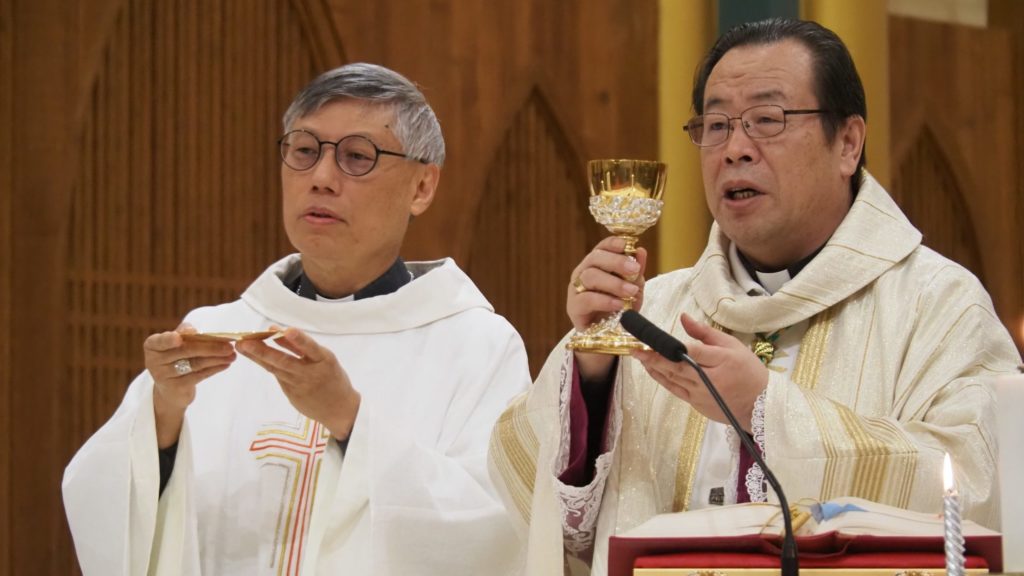Dialogue is the only way forward for Vatican relations with the Chinese government and for Chinese Catholic communities themselves, the bishop of Hong Kong said after visiting Beijing.
Bishop Stephen Chow Sau-yan of Hong Kong traveled to Beijing April 17-21 at the invitation of Archbishop Joseph Li Shan of Beijing, president of the government-approved Chinese Catholic Patriotic Association. It was his first visit to the Chinese mainland since becoming bishop in late 2021.
He spoke about his trip with Jesuit Father Antonio Spadaro, editor of the Italian Jesuit journal La Civiltà Cattolica, for an article published May 12.
In 2018, the Vatican and the government of China signed an agreement outlining procedures for ensuring Catholic bishops are elected by the Catholic community in China and approved by the pope before their ordinations and installations. The agreement was renewed in 2020 and again in 2022.
But in April Chinese authorities transferred Bishop Joseph Shen Bin of Haimen to the Diocese of Shanghai apparently without Vatican agreement. And in November, just a month after the latest renewal, the Vatican issued a public statement of regret, essentially accusing the Chinese government of violating the agreement when Bishop John Peng Weizhao of Yujiang was installed as auxiliary bishop of Jiangxi, "a diocese not recognized by the Holy See."
Asked about those moves, Bishop Chow told Father Spadaro, "My understanding is that the agreement is not dead as some seem to have suggested."
However, he said, there are "discrepancies in the understanding between the two sides on the assignment of bishops to other dioceses," rather than on selecting priests to be ordained bishops.
The issue obviously requires "better understanding," the bishop said. "Hence, more regular and in-depth dialogue could help minimize confusion in the future."
Another major area in need of dialogue, he said, regards the goal of "sinicization" of the Catholic Church in China as well as of all aspects of life in the country.
Many critics inside and outside China describe sinicization as a political ideology aimed at imposing strict rules on communities and institutions to promote and reflect the core values of socialism, autonomy and supporting the leadership of the Chinese Communist Party.
"My impression is that the church on the mainland is still grappling with what sinicization should mean for them," Bishop Chow said. "It has not reached a definitive conclusion at this point. Therefore, it would be meaningful for us to dialogue with them via seminars, so that we can also share with them the meaning and implications of 'inculturation,' which certainly addresses some of their concerns about sinicization. And we are learning from them what sinicization can mean for them."
"According to one of the government officials whom we met during the trip, sinicization is similar to our concept of inculturation," the bishop said. "So, I think that it is better not to jump to a conclusion regarding sinicization for now. It would be more helpful to hold further dialogue on the topic."
At a Mass on his last day in Beijing, Bishop Chow had prayed "for the Holy Spirit to guide us so that we can learn how to love our country and our church at the same time."
The prayer, quoted widely on social media, drew criticism, so Father Spadaro asked him about it.
The Catholic Church teaches that love and respect for one's nation is proper and that citizens have a duty to contribute to building a better society, he said.
"What is the greatest asset of a country? Without a doubt, it is its people. Hence, loving one's country means loving those living in the country," Bishop Chow continued. "As for the church, her greatest asset in this world should not be church buildings but the people of God."
"Loving our country means the dignity of its people should come first," he said. "I believe any responsible government must have the same mission in mind, though the approaches prescribed may vary due to different external factors."
"Having said that, people can enjoy a 'good' life when their government adheres to its mission. The contrary is also true," Bishop Chow said. "It is, therefore, desirable to have an opening for dialogue between the government and the church. For the sake of the country, we should help the government to become better."

